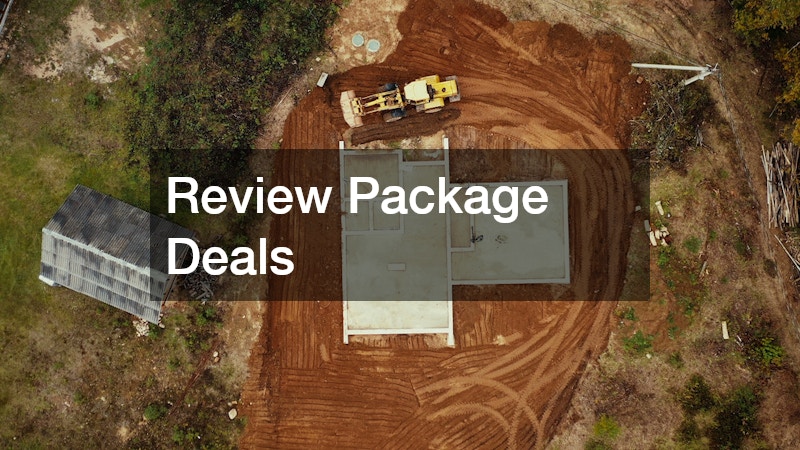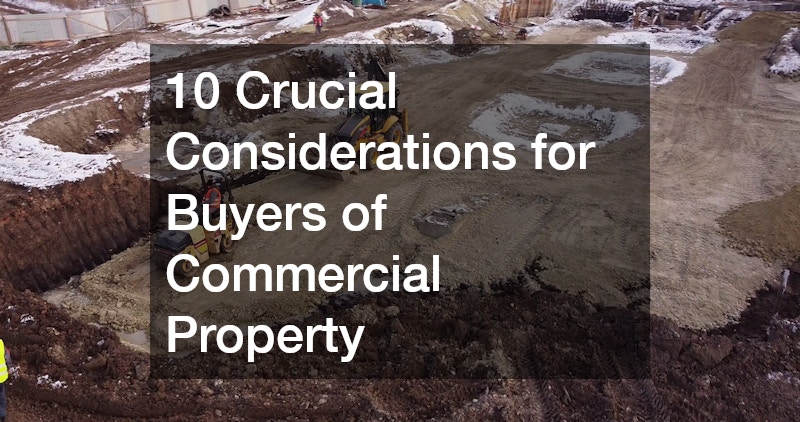Purchasing commercial property is one of the most significant decisions a business owner or investor can make. It’s not just about the price tag or location—it’s about understanding the full spectrum of legal, logistical, and market-driven elements that can impact the property’s long-term value and use. While residential real estate may seem straightforward, commercial acquisitions require more due diligence and strategic planning. Commercial property buyers need to consider everything from zoning rules to land condition, legal documentation to technical surveys, and expert guidance to construction-readiness. Failing to do so can lead to costly setbacks or a property that doesn’t meet your business goals.
This guide breaks down the 10 crucial considerations for buyers of commercial property into easy-to-follow sections. We’ll explore how zoning laws can limit or expand your development options, why reviewing bundled land opportunities might make or break a deal, and how market timing plays a vital role in the financial viability of your purchase. Each of these decisions is nuanced and interconnected, making an informed decision at every stage is vital.
This article is designed to equip commercial property purchasers with a deeper understanding of each aspect of the acquisition process. We aim to ensure that by the time you close the deal, you’re not just confident—you’re fully informed. Read on to explore each of these ten vital areas and learn how you can navigate the complexities of the commercial property landscape with clarity and confidence.
1. Check Zoning Rules
Understanding zoning rules is essential before purchasing any commercial land. Zoning laws determine how a property can be used—whether for retail, industrial, office space, or other functions. These regulations can heavily influence the value and potential of a property, so a buyer should review them thoroughly before moving forward. Local government offices or municipal websites typically provide zoning maps and codes, but interpreting them correctly often requires professional assistance.
For example, land for sale in a mixed-use zone may offer more development flexibility than property restricted to a single use. However, there could be hidden limitations, such as noise restrictions or setback requirements, that could hinder your project. Understanding these nuances is vital to ensuring that the property can legally accommodate your intended business operations.
Buyers of commercial property should consult with local planning departments and possibly even a zoning attorney to ensure full compliance. Verifying allowable uses, identifying any variances or exceptions needed, and anticipating future zoning changes can all help prevent costly surprises. It also sets the stage for a smoother development process post-purchase.
2. Review Package Deals

Land bundles or packages are often marketed as attractive deals to investors and developers. These offers typically include multiple lots or additional services such as utility hookups or road access. While they may seem like a convenient shortcut to getting your project off the ground, they require careful examination. A land package might come with contractual conditions or obligations that are not immediately evident.
In some cases, land packages include lots that are harder to sell individually, which could impact your resale potential. A bundle may also include land that is in flood zones or requires significant grading, raising the total development cost. Without proper analysis, buyers of commercial property might inherit unexpected complications instead of value.
Conducting a side-by-side comparison of what’s included in the package versus buying lots individually can highlight any disparities. Consulting with a financial advisor and land use planner before committing to a bundled deal ensures that what looks good on paper also translates into a practical and profitable investment.
3. Compare Lot Options
Not all parcels of commercial land are created equal. When reviewing pieces of lands for sale, it’s important to consider location, topography, access to infrastructure, and surrounding development. A site that appears ideal at first glance may lack vital elements like road access or utilities, which can drastically affect usability and cost.
For example, two similarly priced lots may differ significantly in development readiness. One may be flat and cleared, while another might require environmental remediation or major grading. These factors influence not only initial expenses but also timelines for completion. People on the hunt for commercial property should therefore dig deep into site characteristics before finalizing their choice.
Working with engineers or development consultants can help identify red flags or opportunities that may not be visible during a casual walkthrough. Soil testing, access to municipal services, and neighborhood growth trends all play a role in determining whether a parcel truly fits your commercial vision.
4. Time the Market

Like any other investment, timing can significantly affect the success of a commercial property purchase. Market cycles determine not just price, but also demand, financing availability, and future resale value. Monitoring local and national trends can help buyers enter the market when conditions are most favorable.
For instance, a land sale during an economic downturn may allow you to secure property below market value, but could also come with higher risk and limited access to capital. Conversely, buying during a hot market could lead to overpaying, but may also yield faster development and leasing opportunities. Timing needs to be balanced with long-term strategy.
Researching recent comparable sales, vacancy rates, and economic forecasts in your target area can guide better decisions. Partnering with a financial advisor or commercial appraiser can also provide insights into whether the timing aligns with your goals or if it’s wiser to wait.
5. Get Pro Insights
Gaining insight from professionals in the field is crucial for making informed commercial property decisions. Real estate experts bring valuable market knowledge, experience with trends, and negotiation skills that are indispensable for first-time and seasoned buyers alike. Buyers of commercial property can benefit from expert guidance in pricing, location assessment, and deal structuring.
A real estate consultant or commercial agent often has access to off-market listings and can identify properties that meet your specific business requirements. Their familiarity with local regulations, leasing patterns, and investment potential can prevent costly missteps. The right advisor can also help determine whether the asking price aligns with market value and your goals.
It’s important to interview multiple agents or consultants, review their track records, and choose one who understands your industry. Aligning with someone who specializes in commercial real estate ensures you’re not just buying property—you’re investing in long-term success.
6. Survey Before Buying

Surveying the land before purchase is a vital step that should never be overlooked. A land surveyor provides accurate boundary lines, identifies encroachments, and verifies the dimensions and topography of the property. This ensures that there are no disputes or surprises post-purchase.
For instance, a survey might reveal that part of a building or fence from a neighboring parcel encroaches on the property, which could lead to legal issues. In other cases, the land might be smaller than advertised, which could affect zoning compliance or development plans. These findings are essential for confirming what you’re buying.
Working with a certified land surveyor also aids in planning for future use. Their reports support permitting, site design, and financing, and are often required by lenders or municipalities. Skipping this step can jeopardize your project timeline and budget.
7. Legal Help Matters
Navigating the legal aspects of a commercial property transaction is complex and often overwhelming. That’s why consulting a real estate law firm is essential. These professionals specialize in reviewing contracts, ensuring title accuracy, addressing zoning disputes, and managing closing documentation. Buyers of commercial property should view this as a non-negotiable part of their due diligence process.
For example, a contract might contain unfavorable clauses that only a legal expert can recognize, such as indemnity provisions, usage restrictions, or limitations on resale. A real estate law firm can also perform a title search to uncover liens or disputes that may threaten your investment. Without this support, you could face costly litigation down the road.
Legal professionals also provide confidence during negotiations, helping you understand rights, obligations, and risks. Their oversight can facilitate a smoother closing and reduce stress, especially if the property involves multiple stakeholders or complex development plans.
8. Scan the Terrain

Technology has become a powerful tool in commercial real estate planning, and LiDAR surveying is one innovation that stands out. LiDAR (Light Detection and Ranging) uses laser technology to create high-resolution, three-dimensional maps of terrain. Buyers of commercial property can use this technology to gain precise data about the land’s surface and subsurface conditions.
This kind of detail is particularly valuable for large or uneven parcels. LiDAR surveying can detect elevation changes, vegetation, drainage patterns, and even hidden obstacles underground. Such insights inform site design, infrastructure planning, and risk assessment before development even begins.
By investing in a LiDAR survey early on, buyers avoid costly surprises during excavation or construction. It enhances planning accuracy and can streamline the permitting process. Developers and investors looking for long-term security and cost efficiency should strongly consider this innovative approach.
9. Hire a Land Guide
Partnering with a knowledgeable land guide, such as a licensed realtor who specializes in commercial transactions, s—can dramatically improve your purchasing experience. Realtors help identify properties, manage negotiations, and facilitate the paperwork and inspections involved. For buyers of commercial property, this guidance adds clarity and security to what can be a very complex process.
A skilled realtor will know the nuances of the local market and can steer you toward properties that match your goals while helping you avoid those with red flags. They often have a pulse on upcoming listings, shifts in market value, and changes in zoning or development regulations that can impact your purchase.
When selecting a realtor, verify their commercial credentials, past successes, and familiarity with your target area or property type. Their expertise can save you time, protect your investment, and connect you with other professionals critical to your real estate journey.
10. Prep the Site Early
Once a property is acquired, preparing the site for development is the next major step. Hiring an excavation company can ensure the land is ready for the next major tasks, like grading, trenching, and removing debris or obstacles. For buyers of commercial property, this early preparation can prevent future delays and budget overruns.
Site readiness involves more than clearing trees—it includes soil stabilization, drainage setup, and creating access routes for construction crews. An experienced excavation company can also spot terrain issues that might require mitigation before building. Addressing these tasks early protects both timeline and investment.
Choosing a contractor with commercial experience is key. They should understand municipal codes, environmental standards, and how to coordinate with surveyors and engineers. Having the right team from the start supports efficient project execution and peace of mind.
Purchasing commercial property isn’t just a matter of finding an attractive piece of land—it’s about understanding the many interconnected factors that determine whether that land will meet your short-term and long-term goals. The ten crucial considerations outlined in this guide cover the full spectrum of what buyers of commercial property need to evaluate before investing. From zoning laws and legal representation to land condition and survey data, each step in the process holds the potential to make or break a deal.
Buyers should invest in the value of timing their investment, comparing land options thoroughly, and leveraging packaged deals only after full scrutiny. The marketplace is diverse, and not every offer is as solid as it appears. Similarly, professional insight from realtors, engineers, and legal advisors adds indispensable layers of protection, helping you avoid risks and capitalize on opportunities you might otherwise miss.
Innovations such as LiDAR surveying and professional excavation services further highlight how much more goes into buying commercial land than what first meets the eye. These tools help you make data-driven decisions and streamline the path from purchase to project development. While these services may add upfront costs, they more than pay for themselves by preventing delays, disputes, and design errors.
Knowledge is your greatest asset when entering the commercial real estate market. Whether you’re expanding a business, launching a new development, or simply diversifying your investment portfolio, being fully informed is essential. Each of the ten considerations in this article has been chosen for its impact and relevance to today’s real estate environment.
Buyers of commercial property who take the time to research, consult experts, and prepare accordingly are in a far better position to turn their land acquisition into a thriving asset. With the right strategy and support system, your next property purchase can become the foundation for long-term growth and success.

